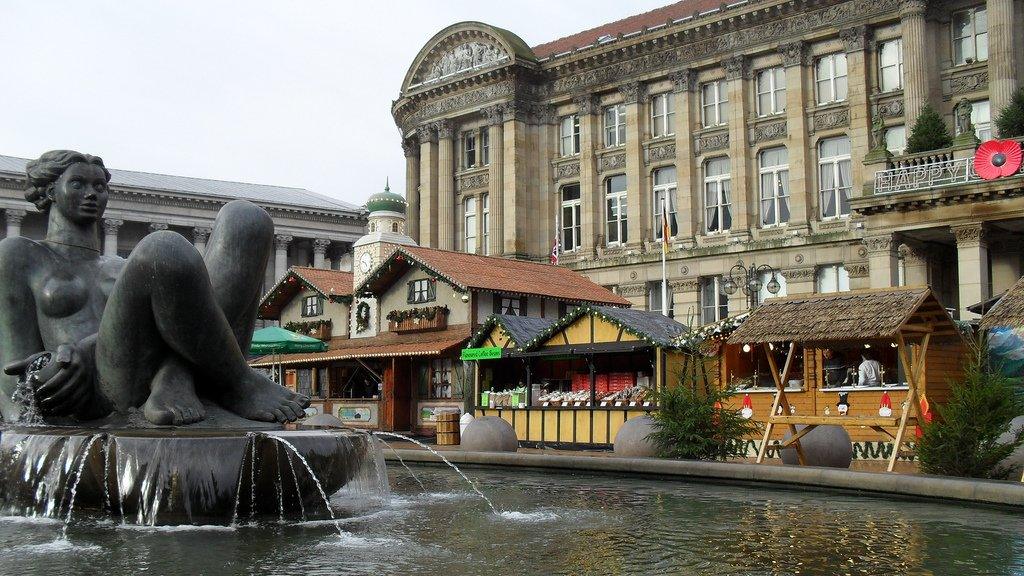Christmas markets: Will Brexit have any effect?
- Published
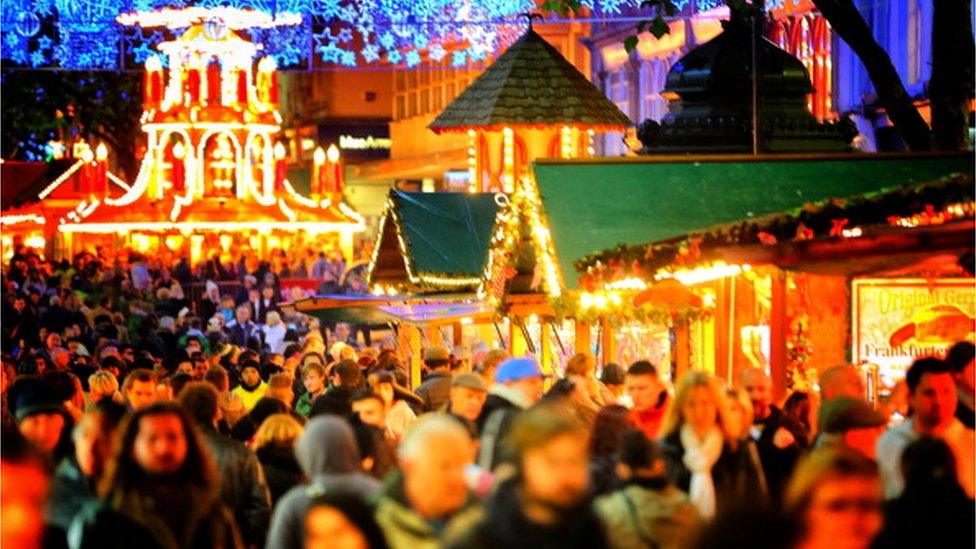
This year the Christmas market in Birmingham is extending its stay
It's that time of year when market traders from Europe make their annual pilgrimage to kick off England's Christmas countdown. It's the first time the rows of glowing wooden huts have been set up since Britain voted to leave the European Union. So will Brexit have any impact on Christmas markets as we know them?
Birmingham is twinkling in anticipation of the Frankfurt Christmas market, external which opens on Thursday with 138 stalls - only eight down from last year. Stallholders have extended their stay until 29 December.
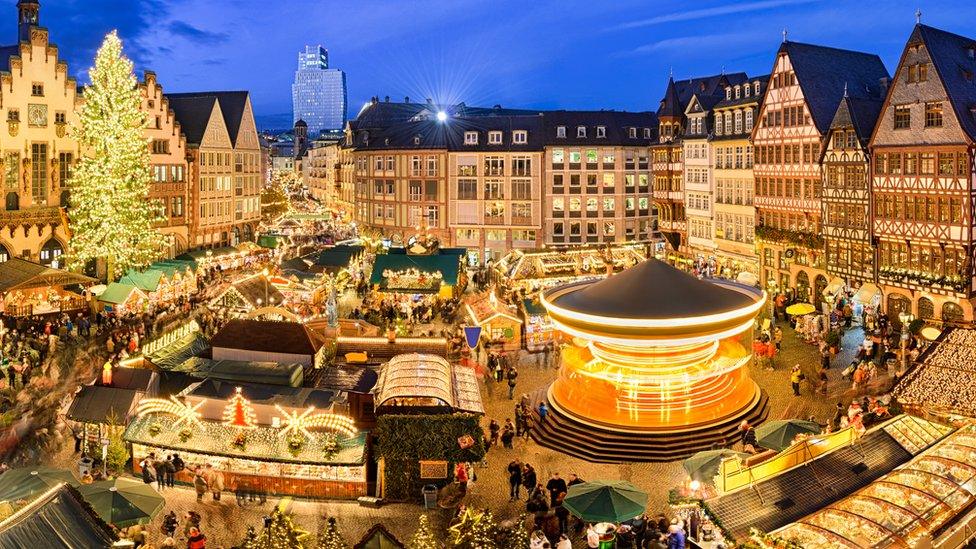
The Christmas market in Frankfurt where stallholders travel from to Birmingham's event
Over in Manchester, the smell of warm Bratwurst and Glühwein is already filling the cold air in an event hailed as the "biggest and best yet", external. And Shropshire is getting ready to welcome traders from Italy, France, Germany Poland and Spain when Telford's Southwater shopping centre holds its first European Christmas market, external from 1 to 23 December.
If these three events are anything to go by, the markets have never been better. But organising the markets, which have become a mainstay of Christmas in the UK, was already well under way by June's EU referendum.
When Britain leaves the EU will it be more difficult for stallholders to come and work here? Will the value of the pound against the euro affect their profits? Will they still feel welcome here?
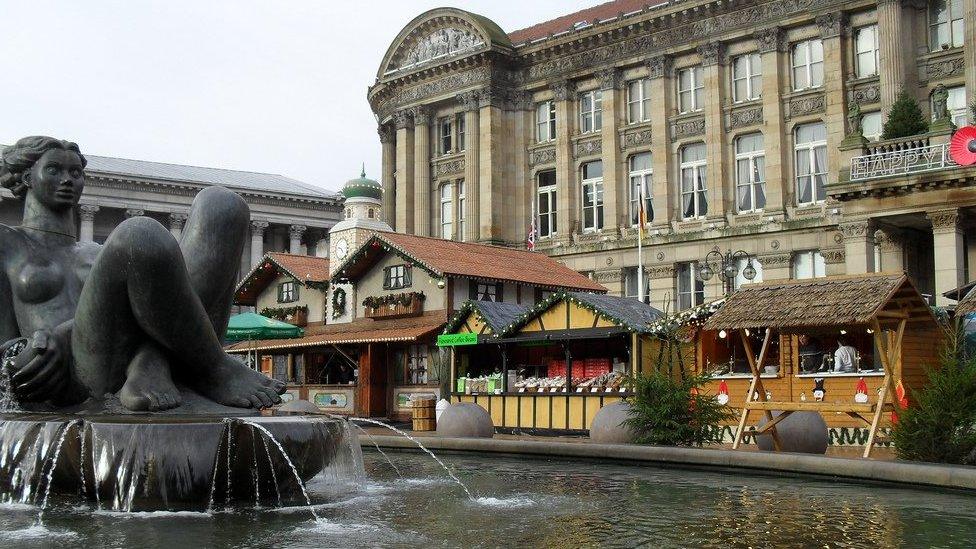
What does Brexit mean for European market traders in Birmingham?
Drei Brum German Market Facts
Eins: In its 16th year, the market has 138 stalls selling everything from nutcrackers to giant iced biscuits
Zwei: The market spans one mile from Victoria Square down New Street
Drei: Chris Moose has his own Twitter account, external to share his favourite festive puns and jokes

Britain must first submit Article 50 to trigger the start of two-year exit negotiations. During this time nothing legal and regulatory will change, says Prof Philip Booth, an academic and research director at the London-based think tank the Institute of Economic Affairs.
Currently EU residents have the right to live and work in the UK. But if the British government imposes permits and visas, stallholders "may just find it more hassle than it's worth", says Prof Booth.
"Unless the government issues temporary permits for that particular issue, some kind of non-bureaucratic arrangement, then if I was a stallholder I think I would be pretty worried."
With many traders relying on seasonal migrant workers to run their stalls, he says stallholders may stop coming to England in favour of EU countries to avoid paperwork and costs.
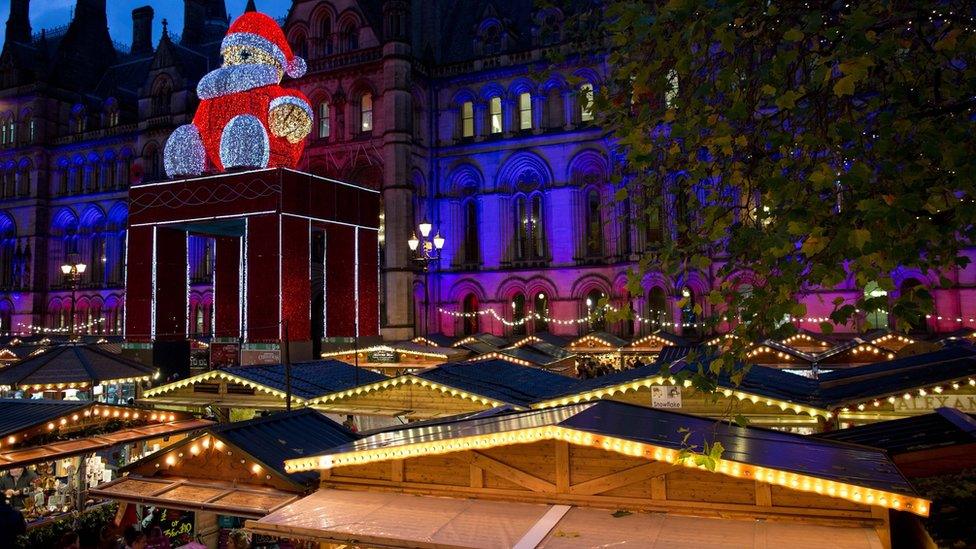
The Christmas Market in Manchester's Albert Square attracts thousands of visitors every year
Allan Hartwell has built his business on bringing European markets to the UK. He thinks if Brexit has an impact it may create more opportunities for British businesses.
The managing director of Market Place, which operates Christmas markets in Belfast, Exeter, Glasgow and Newcastle, says: "It may be that we are doing trade with new countries and that may create opportunities for Christmas markets.
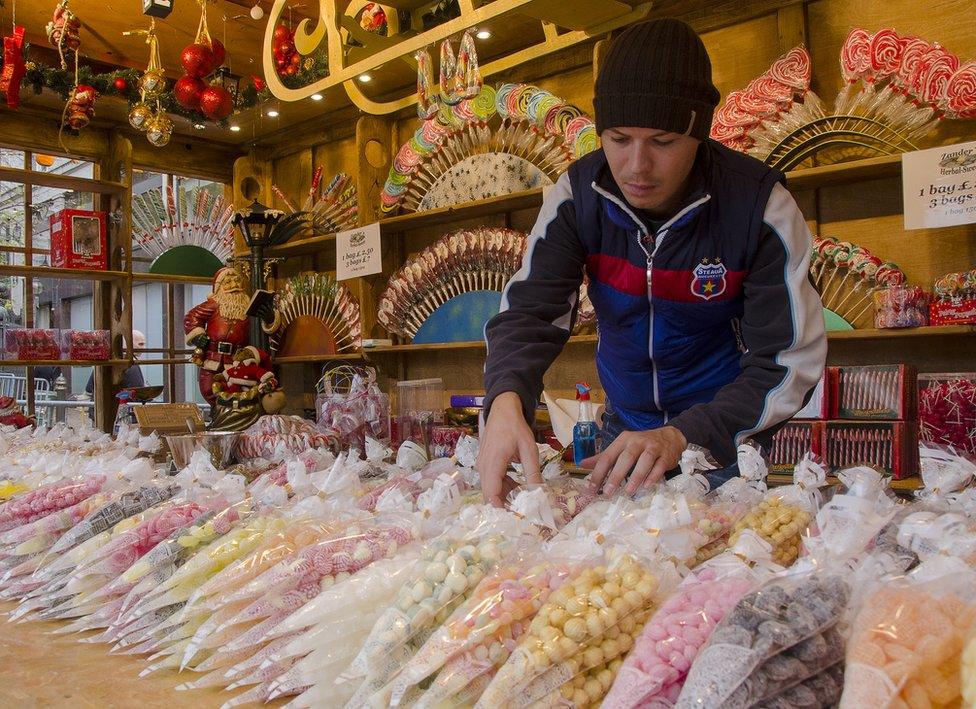
Stallholder Cristian Lus originally hails from Romania
"Even if we start to see a drop-off in the travelling EU traders, it's going to create more opportunities perhaps for local traders to emerge."
So we could see more items with a Made in England stamp.
During last year's Christmas market the exchange rate was 1.4 euros for every £1. The pound plummeted immediately after the referendum result but today it's back up to around 1.16.
The organiser of the Frankfurt Christmas Market in Birmingham, Kurt Stroscher, told the Birmingham Mail:, external "Brexit and the low value of the pound will not have any effect on prices."
As stallholders begin setting out their wares, a full picture of what kind of a welcome they will receive from British shoppers is yet to emerge.
But Astrid Von Der Gathen, a stallholder at Birmingham's Christmas market for more than 10 years, says she is "not worried" because she runs part of her business through a limited company in England.
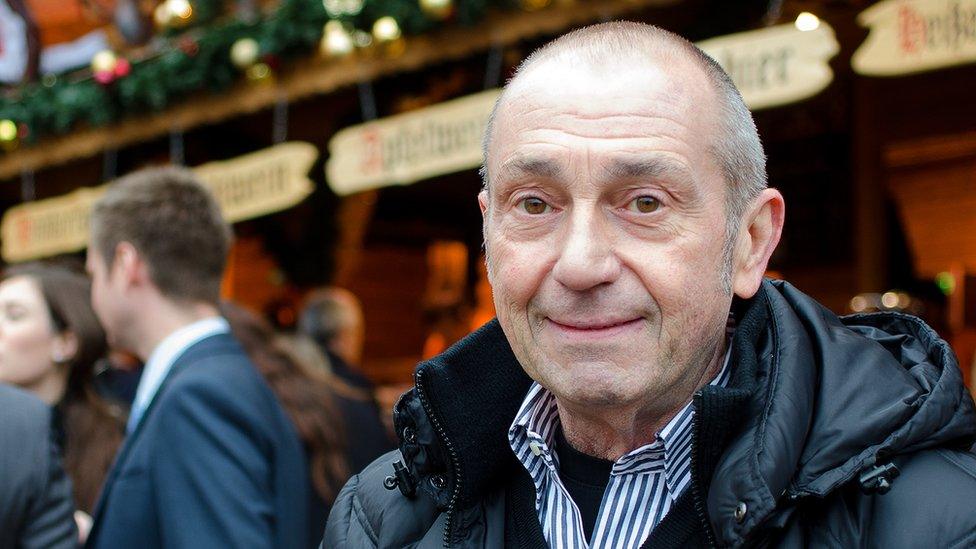
Kurt Stroscher has been organising Birmingham's Frankfurt German market since 2001
And she says she still feels welcome: "England will always be like my second home."
Prof Iain Beggis, from the European Institute at the London School of Economics, does not think trade negotiations will go so far as to turn people away from wooden toys and pretzels.
"Unless of course there is a cultural backlash of 'we don't want them here', however I think the hostilities we have seen since June will fade," he says.
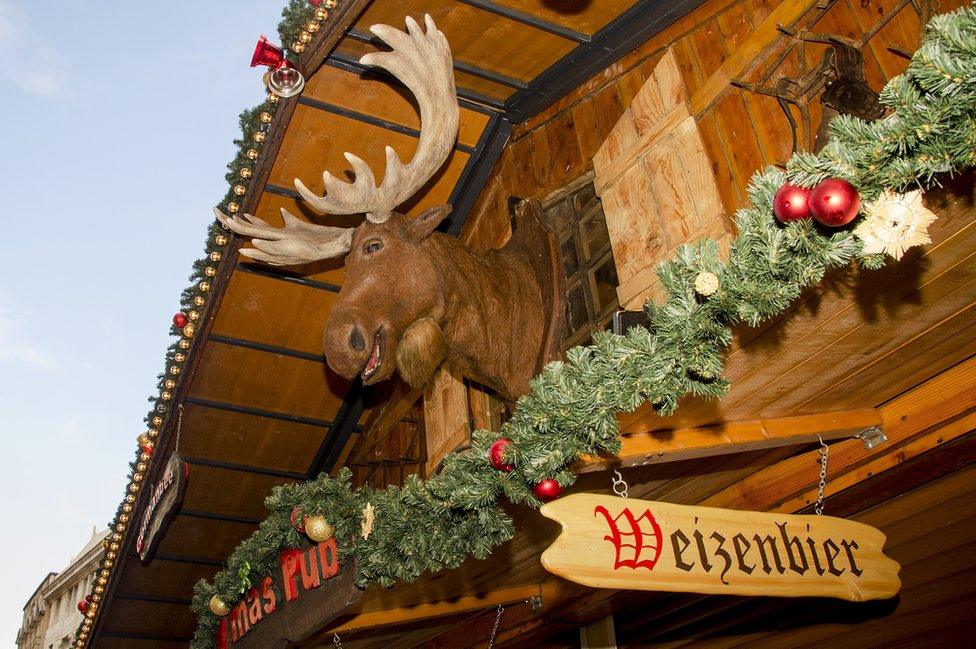
Chris Moose and his terrible jokes are likely to still be welcome in Birmingham
Over in Telford, council arts manager Psyche Hudson says the town is "still very much European" and "eclectic" despite most voters being in favour of leaving the EU.
Back in Birmingham, as Chris Moose the singing moose is unpacked and put back in pride of place on the marketstall pub, Mr Stroscher is pragmatic about the result of Brexit.
He says: "The stallholders of Birmingham's Frankfurt Christmas Market and me, as the organiser of it, are not really happy with the Brexit vote.
"But in my opinion, voting against the EU was political - it was not a vote against friendship with the people of Europe.
"And for me the Frankfurt Christmas Market in Birmingham is a sign of this human friendship."

Your Christmas shopping questions
This story was inspired by Stuart Onyeche who used Your Questions to ask about the future of Birmingham's Christmas market post-Brexit.
He said: "I think regardless of which side of the EU membership debate Brummies fall on, the vast majority of people would agree [the Christmas market] is a very visible example of the beneficial cultural bonds we have with our European neighbours that we want to continue to see flourish after the UK leaves the EU."
- Published12 November 2015
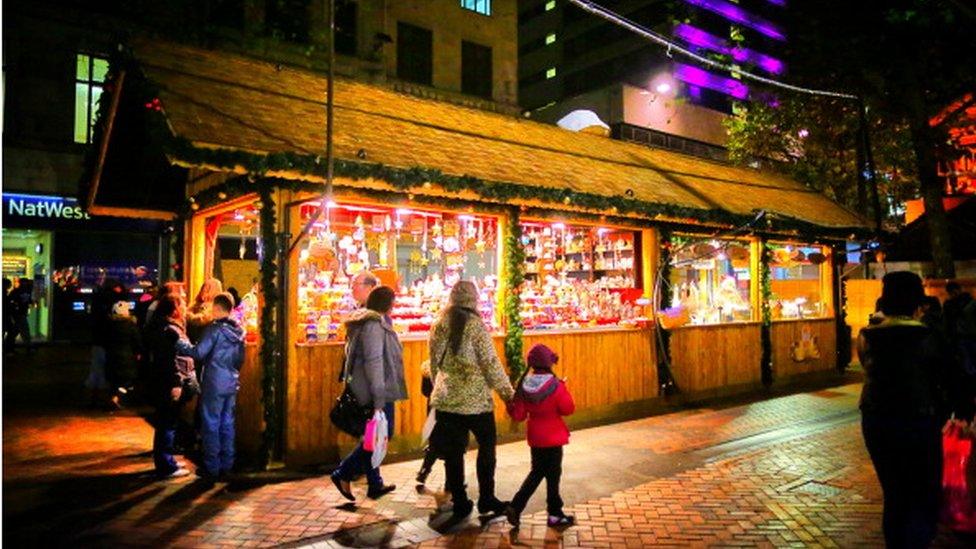
- Published15 November 2014
